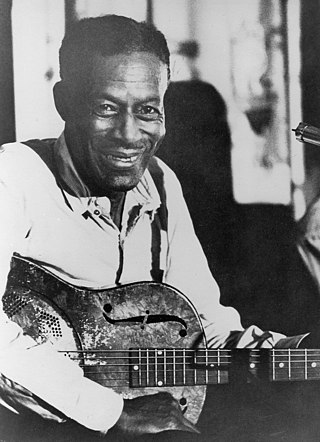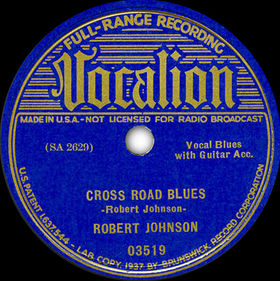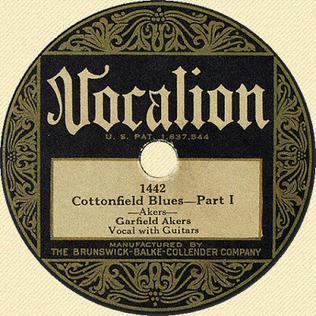Related Research Articles

Robert Leroy Johnson was an American blues musician and songwriter. His landmark recordings in 1936 and 1937 display a combination of singing, guitar skills, and songwriting talent that has influenced later generations of musicians. Although his recording career spanned only seven months, he is recognized as a master of the blues, particularly the Delta blues style, and one of the most influential musicians of the 20th century. The Rock and Roll Hall of Fame describes him as maybe "the first ever rock star".

Edward James "Son" House Jr. was an American Delta blues singer and guitarist, noted for his highly emotional style of singing and slide guitar playing.

Charlie Patton, more often spelled Charley Patton, was an American Delta blues musician and songwriter. Considered by many to be the "Father of the Delta Blues", he created an enduring body of American music and inspired most Delta blues musicians. The musicologist Robert Palmer considered him one of the most important American musicians of the twentieth century.

Willie Lee Brown was an American blues guitar player and vocalist. He performed and recorded with other blues musicians, including Son House and Charlie Patton, and influenced Robert Johnson and Muddy Waters. Brown is considered one of the pioneering musicians of the Delta blues genre.

Ishmon Bracey, sometimes credited as Ishman Bracey, was an American Delta blues singer-guitarist. Alongside his contemporary Tommy Johnson, Bracey was a highly influential bluesman in Jackson, Mississippi, and was one of the area's earliest figures to record blues material. Bracey's recordings include "Trouble Hearted Blues" and "Left Alone Blues", both of which appear on several compilation albums.
"Blind Joe" Reynolds, was an American singer-songwriter and blues guitarist.
King Solomon Hill is the name assigned to a blues singer and guitarist who recorded a handful of songs in 1932. His unique guitar and voice combined to produce a sound that has been described as haunting. After much speculation and dispute, he has been identified as Joe Holmes, a self-taught guitarist from Mississippi.
Le Moise Roosevelt Graves, credited as Blind Roosevelt Graves, was an American blues guitarist and singer, who recorded both sacred and secular music in the 1920s and 1930s.

"Cross Road Blues" is a song written by the American blues artist Robert Johnson. He performed it as a solo piece with his vocal and acoustic slide guitar in the Delta blues-style. The song has become part of the Robert Johnson mythology as referring to the place where he supposedly sold his soul to the Devil in exchange for his musical talent. This is based largely on folklore of the American South that identifies a crossroads as the site where such pacts are made, although the lyrics do not contain any references to Satan or a Faustian bargain.
H. C. Speir was an American "talent broker" and record store owner from Jackson, Mississippi. He was responsible for launching the recording careers of most of the greatest Mississippi blues musicians in the 1920s and 1930s. It has been said that, "Speir was the godfather of Delta Blues" and was "a musical visionary". Without Speir, Mississippi's greatest natural resource might have gone untapped."

"Rollin' and Tumblin'" is a blues standard first recorded by American singer-guitarist Hambone Willie Newbern in 1929. Called a "great Delta blues classic", it has been interpreted by hundreds of Delta and Chicago blues artists, including well-known recordings by Muddy Waters. Rock musicians usually follow Waters' versions, with the 1960s group Cream's rendition being perhaps the best known.

"Stop Breaking Down" or "Stop Breakin' Down Blues" is a Delta blues song recorded by Robert Johnson in 1937. An "upbeat boogie with a strong chorus line", the lyrics are partly based on Johnson's experience with certain women:

"Dust My Broom" is a blues song originally recorded as "I Believe I'll Dust My Broom" by American blues artist Robert Johnson in 1936. It is a solo performance in the Delta blues-style with Johnson's vocal accompanied by his acoustic guitar. As with many of his songs, it is based on earlier blues songs, the earliest of which has been identified as "I Believe I'll Make a Change", recorded by the Sparks brothers as "Pinetop and Lindberg" in 1932. Johnson's guitar work features an early use of a boogie rhythm pattern, which is seen as a major innovation, as well as a repeating triplets figure.
Gayle Dean Wardlow is an American historian of the blues. He is particularly associated with research into the lives of the musicians Charlie Patton and Robert Johnson and the historical development of the Delta blues, on which he is a leading authority.

Garfield Akers was an American blues singer and guitarist. He had sometimes performed under the pseudonym "Garfield Partee". Information about him is uncertain, and knowledge of his life is based almost entirely on reports of a few contemporary witnesses.
Big Chief Henry's Indian String Band was a Choctaw Indian string band from Oklahoma, United States. The band was composed of members of the Hall family—Henry, father, on vocals and fiddle; and sons Clarence on guitar and Harold on banjo. They played from Wichita, Kansas.
Mattie Delaney was an American Delta blues singer and guitarist active in the 1930s. Only two recordings by her are known: "Down the Big Road Blues" and "Tallahatchie River Blues".
Arthur Charles Laibly was an American record producer and sales manager. He was the first to make commercial recordings of Blind Lemon Jefferson and Skip James, and also recorded many other notable blues performers including Charley Patton and Son House, for Paramount Records in the 1920s and early 1930s.
"Bogus" Ben Covington was an American country blues singer, harpist, and mandolin-banjo player. Originally a resident of Louisiana, Covington was active in Mississippi and recorded in the late-1920s and 1930s, presumably under various names such as Blind Ben Covington, Ben Curry, and Memphis Ben. He also occasionally performed alongside Big Joe Williams, King Solomon Hill, and Speckled Red.
References
- 1 2 Eagle, Bob L.; LeBlanc, Eric S. (2013). Blues: A Regional Experience. ABC-CLIO. p. 221. ISBN 9780313344244.
- ↑ Komara, Edward; Lee, Peter (2004). The Blues Encyclopedia. Routledge. p. 722. ISBN 9781135958329.
- 1 2 3 4 5 Wardlow, Gayle Dean (1998). Chasin' That Devil Music: The Search for the Blues. Backbeat Books. p. 71. ISBN 9780879305529.
- ↑ Komara, Edward M. (2006). Encyclopedia of the Blues: K-Z, index. Taylor & Francis. p. 722. ISBN 9780415927017.
- ↑ Oliver, Paul (2006). Broadcasting the Blues: Black Blues in the Segregation Era. Routledge. p. 140. ISBN 9781135467166.